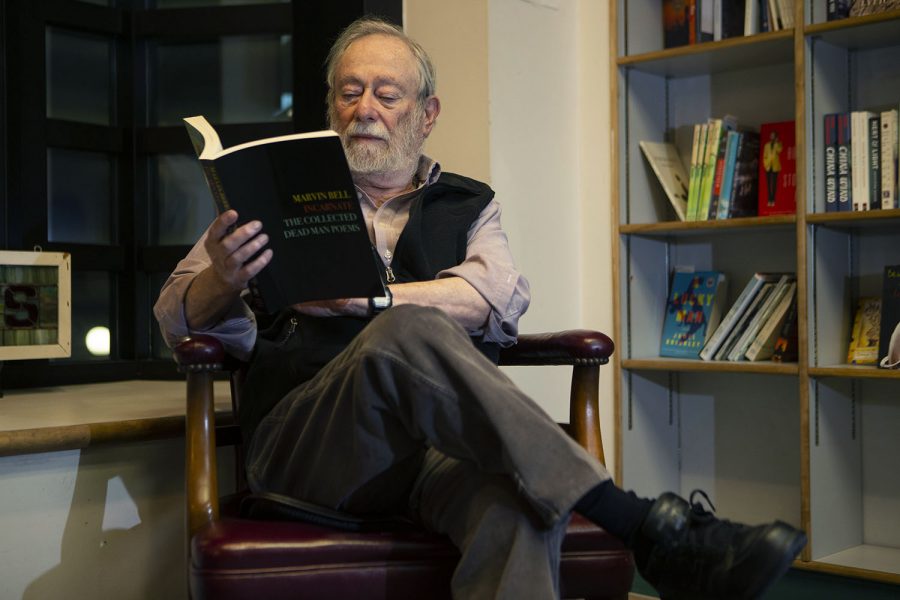Former Writers’ Workshop Professor Marvin Bell returns to Prairie Lights with latest collection of poems
Having taught at the UI for 40 years, prolific poet Marvin Bell shares his most recently published collection, ‘Incarnate: The Collected Dead Man Poems,’ sharing his philosophical yet accessible work with residents of Iowa City.
Poet and former Iowa Writers Workshop instructor Marvin Bell opens his book, Incarnate: The Collected Dead Man Poems before sharing some of his work during a reading at Prairie Lights on Wednesday, Nov. 6, 2019. This book departs from the style of his other work, utilizing full sentences and altering form.
November 7, 2019
A former professor at the Iowa Writers’ Workshop for nearly 40 years and an ever-prolific poet in his wizened years, Marvin Bell’s returned to Prairie Lights, sharing poetry with the Iowa City public from his latest published collection entitled Incarnate: The Collected Dead Man Poems.
A crowd ranging from fresh college students to those who are long retired, the second floor of the independent bookstore saw nothing but filled space for Bell. Smiling and chuckling at the poems he himself described as “weird,” the author beamed a light, cheery attitude to the attendees.
“I’ve been hearing him read for many years,” said Craig Kesler, one of the Iowa City listeners of the evening. “It’s always a pleasure to hear anything he has to read. He’s one of a dying breed.”
Kesler said that Bell was a one-of-a-kind writer as well. In view of the work shared at the reading, Bell’s style in his latest collection emanates this originality, this one-of-a-kindness in both how he created it and its poetic form.
In the damp, seeping-cold winter of Port Townsend, Washington nearly three decades ago, the author wrote the first of the poems following the uniform style of Incarnate. Calling it “From the Book of the Dead Man,” Bell characterized the style as one of so-called “wisdom books” such as the Egyptian Book of the Dead or Tibetan Book of the Dead.
The style of the poem was distinct, broken into two parts, each with their own title. The lines of the poetry also took their own rhythm, lacking a specific meter or even free-verse playfulness with enjambments; Bell took each line, making it a sentence itself.
“I had been writing all kinds of free-verse for so many years; I just thought it had lost some of its freshness,” Bell said. “For me, to be an artist means you’re pushing the envelope.”
This first poem, however, written when Bell was 53, was not followed by another for about four years. This book marks the last of these poems, having written the last of them at 81. And just like Bell’s poetry throughout the years not falling into this particular form, he covers a myriad of subjects to evoke emotions from most any reader.
“They’re so deep and accessible and matter-of-fact and comic all at the same time,” said Janet Lesner, another Iowa City resident. “I have a very emotional response to it.”
Bell said the effect of his writing on other people, reactions like Lesner’s, are what he calls the “bonuses” of poetry. Poetry, in his view, is first and foremost for the poet, yet he still cherishes the “bonuses.” The reading, along with the audience engagement with a question and answer, showed clear signs of an established literary community.
Yet this community in Iowa City is one he has grown into. Bell said he considered himself a “student-bum” during his time at the UI, yet he has written and kept writing to achieve a proud legacy. Bringing the latest part of this legacy to life in voice, having finally put it to rest in writing, Bell’s poems concerning the Dead Man may just breathe an everlasting, philosophical spirit into the minds of readers.















